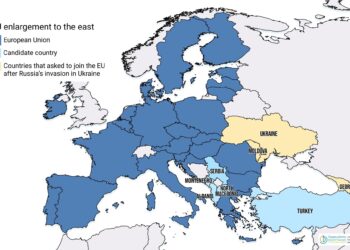Escalating Diplomatic Strain Between Budapest and Kyiv
In a meaningful escalation of diplomatic tensions in Eastern Europe, Hungary and Ukraine have each expelled diplomats from the other’s capital amid allegations of a Hungarian espionage network operating within Ukrainian borders. This development, reported by Radio Free Europe/Radio Liberty, occurs against a backdrop of rising geopolitical tensions in the region. The relationship between Hungary and Ukraine has soured over various issues, including minority rights and security concerns. These expulsions highlight the fragile state of diplomatic relations where accusations of espionage can quickly incite nationalistic sentiments and lead to severe diplomatic fallout. As both nations navigate this latest crisis, the implications for regional stability and international diplomacy remain uncertain.
Effects of Diplomatic Expulsions on Regional Cohesion
The recent fallout between Hungary and Ukraine signifies an alarming rise in tensions following claims from Kyiv regarding alleged Hungarian spy activities within its territory. In response to these serious allegations, Ukrainian officials accused several Hungarian diplomats of conducting intelligence operations, leading to reciprocal expulsions that underscore the seriousness of the situation. This incident marks a notable decline in relations already strained by historical grievances as well as ongoing disputes related to minority rights and energy policies.
Experts are voicing concerns about how this escalating crisis could impact regional cohesion. The intricate relationship between these two nations is shaped by multiple factors:
- Historical Tensions: Long-standing animosities rooted in events such as World War II.
- Ethnic Minority Concerns: The status and treatment of ethnic Hungarians living in Ukraine versus Ukrainians residing in Hungary.
- Geopolitical Affiliations: Hungary’s ties with Russia contrasted against Ukraine’s alignment with NATO member states.
The breakdown in diplomatic relations may not only impede bilateral interactions but also disrupt broader regional cooperation on critical issues like energy security and border management strategies.
Implications for Hungary-Ukraine Relations
The mutual expulsion of diplomats represents a significant turning point for already tenuous ties between Budapest and Kyiv. Following accusations regarding espionage activities attributed to Hungarian operatives within Ukraine, both countries reacted decisively—an exchange that raises alarms about future collaboration prospects. Ukrainian authorities have accused Hungary of violating their sovereignty through alleged spying efforts; however, Hungary has firmly denied these claims while reiterating its commitment to respecting Ukraine’s territorial integrity based on principles of mutual respect.
This escalation carries several critical implications for their bilateral relationship:
- Eroding Trust: The reciprocal expulsion indicates a ample loss of trust which complicates any future diplomatic engagements.
- Affecting Advocacy for Minority Rights: Given Hungary’s role as an advocate for ethnic Hungarians’ rights within Ukraine, this fallout could obstruct negotiations concerning their treatment.
- Evolving EU Relationships: As both countries navigate their responsibilities within the European Union framework, this incident may alter their positions regarding broader regional cooperation initiatives.
| Description | Date Occurred |
|---|---|
| Arousing Allegations Regarding Spy Network | October 2023 |
| Diplomats Expelled from Both Nations < | October 2023 |
| Emergency Discussions Scheduled | Upcoming |
Strengthening Security Protocols for Regional Collaboration
The recent diplomat expulsions highlight an urgent need for enhanced security measures across Eastern Europe amidst ongoing concerns over espionage activities. It is crucial that nations collaborate to establish frameworks focused on intelligence sharing aimed at deterring such incidents moving forward.Implementing joint task forces alongside regular meetings among security agencies can foster trust while enhancing transparency across borders—thus reducing risks associated with similar occurrences down the line.
Additionally,diplomatic resilience should be cultivated through collaborative training programs centered around counter-intelligence tactics along with effective crisis management strategies designed specifically tailored towards strengthening inter-state relationships.
Governments must also prioritize thorough cybersecurity initiatives aimed at safeguarding sensitive facts against foreign interference threats.
These initiatives might encompass developing robust cybersecurity protocols alongside conducting routine vulnerability assessments coupled with joint workshops intended specifically designed educate diplomatic personnel about recognizing potential threats posed by external actors.
Moreover,< strong public awareness campaigns highlighting risks linked directly back towards espionage will empower citizens enabling them report suspicious behaviour thereby creating more vigilant societies supporting national security objectives overall.
Conclusion: Evaluating Current Developments
In summary, escalating tensions between Budapest and Kyiv have reached new heights following revelations surrounding alleged spying operations conducted by Hungarian diplomats operating out-of-Kyiv premises resulting ultimately leading into reciprocal diplomat expulsions signaling deteriorating relationships likely impacting wider regional dynamics significantly affecting cooperative efforts going forward . As both parties navigate through unfolding circumstances , it remains imperative they engage openly addressing shared concerns diplomatically rather than resorting hostility paving way towards establishing stable habitat conducive fostering peace & collaboration throughout Eastern Europe moving ahead .











